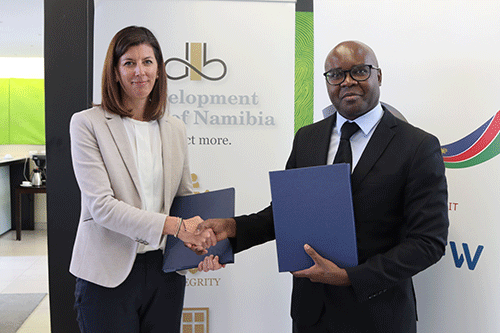The Development Bank of Namibian (DBN) and KfW Development Bank signed the second concessional loan of around N$600 million (translating to €30 million) on 30 August 2023. This financing is to be used for the development of Namibian climate-related infrastructure such as renewable energy, water, and low-carbon transport projects.
Climate-appropriate financing is fast-growing, not only globally, but also in Namibia. The DBN addresses this much-needed financing in the local market with the support of the German Development Cooperation. DBN’s portfolio of climate-mitigating projects encompasses infrastructure projects for solar photovoltaic and wind generation, as well as rural and urban water infrastructure and public transport projects.
The new credit line will provide long-term financing to enable the DBN to provide private and public investors incentivised conditions for climate-related infrastructure projects.
This latest loan follows the first credit line of approximately N$240 million signed in December 2018, which was successfully placed in the market, primarily assisting private companies to set up solar PV infrastructure.
At this week’s signing ceremony, KfW Country Director Beatrice Lucke congratulated the DBN, saying “The DBN’s main objective to contribute to economic growth and social development in Namibia will increasingly be achieved by attracting investment in green and transformative infrastructure, which is the basis for any sustainable development around the world.” She hopes that the concessional loan can be used to finance projects which maximise these objectives.
DBN CEO Martin Inkumbi said the bank has built up a significant project pipeline for eligible projects, particularly in the renewable energy space, over the past years, and is looking forward to ultimately move ahead with the financing. He added that access to affordable financing is a key element for the realisation of climate-related infrastructure projects, and that the bank is not just aware of the need for infrastructure which reduces emissions, but also for climate adaptation in light of the threats of heat and drought to Namibia.
Inkumbi expressed his appreciation to KfW and the German government for the relationship that aims to provide solutions to climate challenges, and said the funding would provide the bank additional leeway to further develop and refine models and options.
This, he noted, would assist in growing the bank’s portfolio of projects to address climate change and adaptation, and position the DBN as the “national and regional climate bank”.



